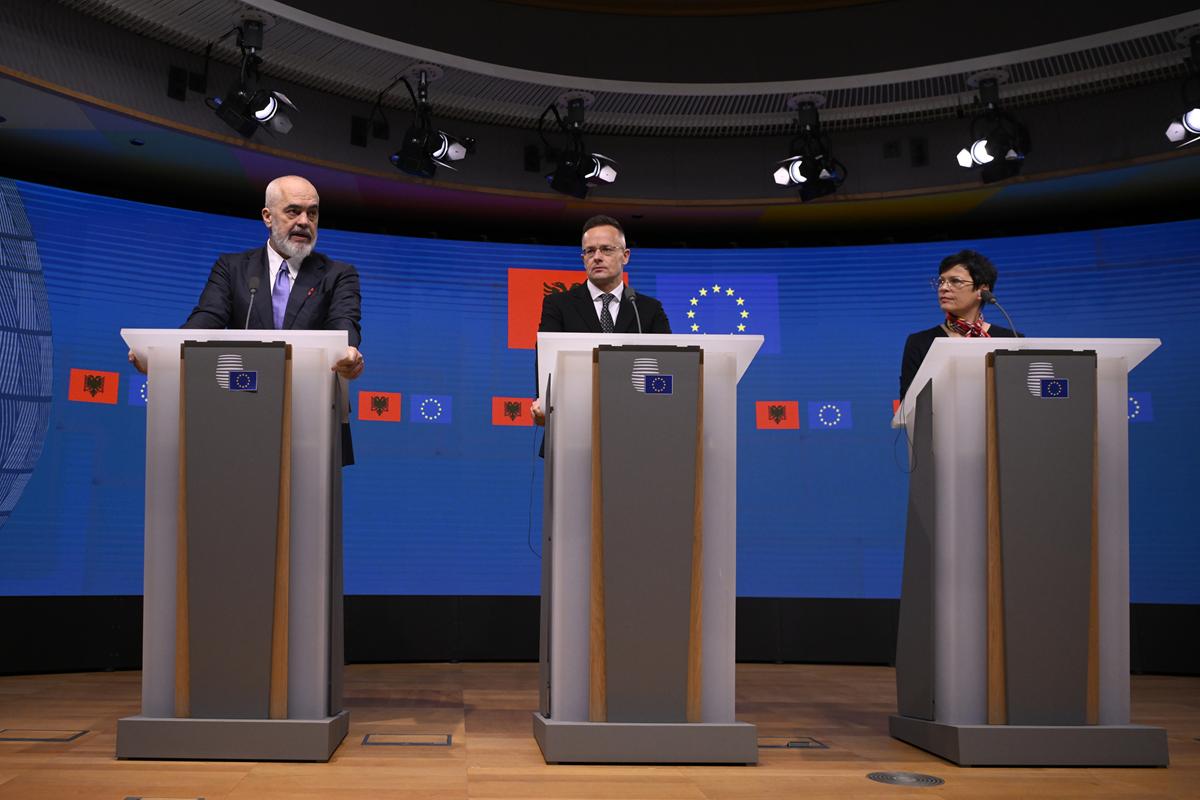The Hungarian EU Presidency has focused on the Western Balkans, and the Government considers their engagement in the integration process to be particularly successful.
Three Montenegro EU accession chapters closed
Three EU accession chapters with Montenegro have been closed, Péter Szijjártó, the foreign minister, in Brussels on Monday, adding that after 7.5 years, the integration process was speeding up thanks to the Hungarian EU presidency.
After the EU-Montenegro Intergovernmental Conference, Szijjártó told a press conference that Hungary’s presidency prioritised enlargement in view of the importance of stability, peace and development in the Western Balkans.
He said that the region’s countries have been in the EU membership corridor for 15 years on average, adding that in the absence of rapid progress, “we’d be putting not only the credibility of enlargement policy at risk but that of the entire EU in peril, too”.
He said Montenegro submitted its application in 2008, became a candidate in 2010, and negotiations began in 2012.
A merit-based process in theory had not worked in practice, “and somehow enlargement didn’t make progress even if the performance of candidate countries was good”.
Negotiation chapters on intellectual property rights, media, and enterprise and industrial policy were closed, he noted, adding that the last time the EU wrapped up a negotiation chapter with Montenegro was seven and a half years ago.
Szijjártó said Montenegro brought strength, momentum, freshness to the bloc, “something that we sorely need”, and “mutual benefits for Montenegro and the whole EU”.
Montenegro brought few risks as the bloc could easily handle the increase in population, he said. He added that as a NATO and a unilateral adopter of the euro currency, adaptation would be smooth.
Hungary’s largest bank, OTP, “is the market leader in Montenegro”, and Hungarian telecommunications company 4iG also plays an important role in Montenegro’s digitalisation development, he said.
Montenegro’s prime minister, Milojko Spajic, expressed gratitude to the Hungarian presidency for its work in speeding up the enlargement process.
Major progress made in the Serbian EU accession process
The Hungarian EU presidency has made a major step forward in advancing EU enlargement as EU affairs ministers in Brussels have approved opening a third chapter group for Serbia, according to a presidency statement on Tuesday.
Balint Odor, the head of Hungary’s Permanent Representation to the European Union, has sent a letter to the Serbian head of EU Mission on behalf of the Council of the European Union, inviting Serbia to submit its negotiating position on Chapter 16 on taxation and Chapter 19 on social policy and employment, which belong to the third group of chapters covering the topic of competitiveness and inclusive growth, the statement said.
This “significant step” for Serbia energises accession negotiations and the enlargement process, Odor wrote on the X platform.
The EU Council has held two intergovernmental conferences. On Monday, three accession chapters were closed with Montenegro, while on Tuesday the second group was opened with Albania, the statement noted.
read also: Hungary strengthening ties with Bosnia and Herzegovina
EU opens new accession chapters with Albania
The European Union has opened new accession chapters with Albania for the second time in two months, Szijjártó said in Brussels on Tuesday, calling the development “a great success” for Albania and the Hungarian EU presidency.
Hungary is clear-eyed about the importance of the region’s stability, peace, and progress. Szijjártótold a press conference after the EU-Albania intergovernmental conference, noting that the presidency prioritised the bloc’s enlargement.
Western Balkan countries have been waiting for EU membership for an average of 15 years, Szijjártó said. “That is unacceptably long and disrespectful to those countries,” he said.

Albania applied for membership in 2009 and became a membership candidate in 2014. Negotiations started in 2022, “but we had to wait until 2024, and the Hungarian presidency for the actual process to start,” Szijjártó said. The past two months, he added, had seen more progress than the previous 15 years.
Szijjártó said that opening the chapters relating to foreign ties and security policy was a good decision in view of Albania’s “excellent performance” in the field. The country, he said, was a reliable NATO ally and “has performed well in the UN Security Council”.
The minister said that Hungary had firsthand experience on the “enormous progress” that Albania’s economy had made in the past few years, as Hungarian companies in top positions on the Albanian market could attest to.
Hungary and Albania earlier signed an agreement on the training of 50 Albanian public servants at the Hungarian Diplomatic Academy, “because Hungary well remembers how complicated the EU accession process can be,” he said.
Asked about a remark by Estonian counterpart Margus Tsahkna that he felt Szijjártó was “playing for another team”, the minister said he was “absolutely right”. “We play for another team: he’s on the pro-war team, and I’m on the pro-peace team.”
read also: Hungary praises Albania’s progress on path to integration